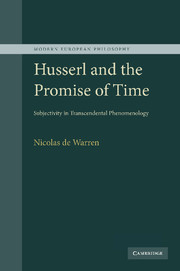Description
Husserl and the Promise of Time
Subjectivity in Transcendental Phenomenology
Modern European Philosophy Series
Author: Warren Nicolas de
This book examines Husserl's treatment of time-consciousness and its significance for his conception of subjectivity.
Language: English
Subject for Husserl and the Promise of Time:
Approximative price 49.66 €
In Print (Delivery period: 14 days).
Add to cart
Husserl and the Promise of Time
Publication date: 07-2012
Support: Print on demand
Publication date: 07-2012
Support: Print on demand
Approximative price 87.13 €
Subject to availability at the publisher.
Add to cart
Husserl and the promise of time: subjectivity in transcendental phenomenology
Publication date: 11-2009
322 p. · 15.7x23.4 cm · Hardback
Publication date: 11-2009
322 p. · 15.7x23.4 cm · Hardback
Description
/li>Contents
/li>
This book provides an extensive treatment of Husserl's phenomenology of time-consciousness. Nicolas de Warren uses detailed analysis of texts by Husserl, some only recently published in German, to examine Husserl's treatment of time-consciousness and its significance for his conception of subjectivity. He traces the development of Husserl's thinking on the problem of time from Franz Brentano's descriptive psychology, and situates it in the framework of his transcendental project as a whole. Particular discussions include the significance of time-consciousness for other phenomenological themes: perceptual experience, the imagination, remembrance, self-consciousness, embodiment, and the consciousness of others. The result is an illuminating exploration of how and why Husserl considered the question of time-consciousness to be the most difficult, yet also the most central, of all the challenges facing his unique philosophical enterprise.
Acknowledgements; Introduction: the promise of time: subjectivity in Husserl's transcendental phenomenology; 1. The ritual of clarification; 2. A rehearsal of difficulties; 3. The ghosts of Brentano; 4. The retention of time past; 5. The impossible puzzle; 6. The lives of others; 7. The life of consciousness; Appendix: note on textual sources; Bibliography.
© 2024 LAVOISIER S.A.S.




